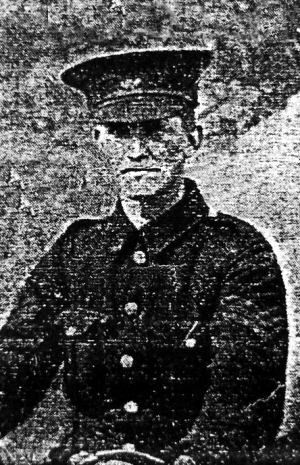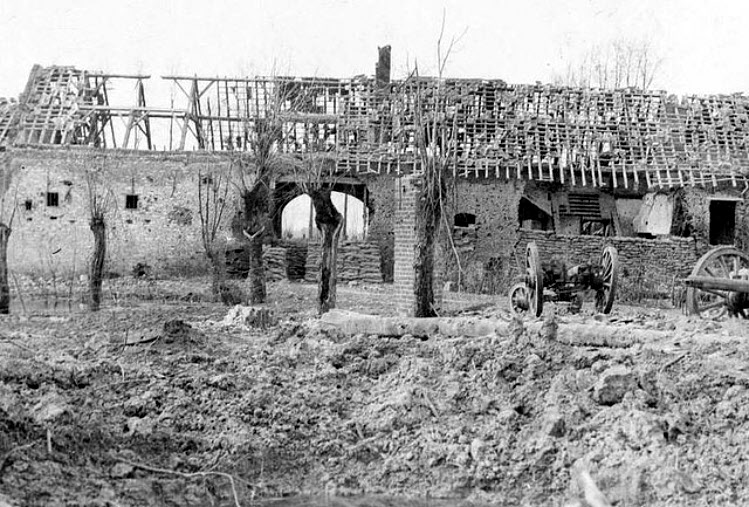
513, King’s Own Yorkshire Light Infantry, 1st/4th Battalion
Fred Smith was born in 1890, the second son of four surviving sons, born to Joseph Fisher Smith and his wife, Sabina (nee Bowers), who married in early 1879. They had six children from their marriage, but two children died before April 1911. Sabina was born at Horbury Bridge and the rest of the family were born in Ossett.
In 1911 Joseph, and Sabina were living at the two-roomed 29, Little Town End, Ossett, their home since their marriage. Living with them in 1911 were three sons, including Fred, who was working as a carboniser for a mungo manufacturer. His father, Joseph Smith was working a rag shaker, then later as a rag dyer and latterly a chimney sweeper.
On the 27th April 1912, at Ossett Holy Trinity Church, 22 year-old Fred Smith married 28 year-old spinster Edith Allsop. Fred gave his address as 29, Little Townend, Ossett and Edith was living on Horbury Road, Ossett.
Fred Smith’s army service record has not survived, but it is known that he enlisted in Ossett and joined the 1st/4th Battalion of the King’s Own Yorkshire Light Infantry with a service number 513, which suggests that he served in the Territorial Force prior to the outbreak of the war. He rose to the rank of Sergeant and was killed in action on the 31st May 1915.
The 1/4th Battalion, Kings Own Yorkshire Light Infantry was a unit of the Territorial Force with HQ in Wakefield, serving with 3rd West Riding Brigade, West Riding Division. When war broke out in August 1914, the units of the Division had just departed for their annual summer camp at Whitby, and they were at once recalled to their home base and mobilised immediately for war service, moving to Doncaster. In November they moved to Gainsborough and in February 1915 to York to prepare for service overseas, those men who had not volunteered for Imperial Service transferred to the newly formed 2/4th Battalion. They proceeded to France, from Folkestone landing at Boulogne on the 12th of April 1915 and the Division concentrated in the area around Estaires. On the 15th of May the formation was renamed 148th Brigade, 49th (West Riding) Division. Their first action was in the The Battle of Aubers Ridge in May 1915. In 1916 They were in action in the Battles of the Somme. In 1917 they were involved in the Operations on the Flanders Coast and the The Battle of Poelcapelle during the Third Battle of Ypres. In 1918 they were in action during the Battles of the Lys, The pursuit to the Selle and the Final Advance in Picardy. At the Armistice, The 49th Division was resting at Douai, demobilisation began in early 1919.
Sergeant Fred Smith was posthumously awarded the British and Victory Medals and also the 1914/15 Star.
The “War Diary” for the 1st/4th KOYLI tells us that on the 22nd May 1915, 49th (West Riding) Division were ordered to undertake offensive operations in the neighbourhood of Touquet. Working parties of men from the battalion were digging new trenches in advance of the existing lines on the Bois-Grenier – Bridoux Road. The new trench was to include two ruined houses situated on the road about half-way between the 1st/4th KOYLI trenches and the German trenches. Unfortunately, the ruined buildings were occupied by a strong force of Germans who constantly fired on the working parties digging trenches with rifle and machine gun fire. There were 5 other ranks killed and 10 wounded on the 22nd May alone. For the rest of the week, whilst the trenches were being dug, there were many more casualties.
From the 25th May to the 31st May 1915, the new British trenches were heavily shelled every day by the Germans with 1st/4th KOYLI taking casualties every single day. May 31st seems to be the last day of heavy shelling, but on that day, two other ranks were killed outright and six more were wounded. We know that one of the men killed that day was Sergeant Fred Smith.
The “Ossett Observer” 1 had this obituary for Fred Smith:
“Ossett Sergeant’s Sacrifice – Killed While Asleep – From the beautiful letter which we print below, received from Captain Critchley by the widow of Sergeant Fred Smith, of the local Territorials, who has given his life while fighting for his country. The soldier was not killed in the advance which the 4th King’s Own Yorkshire Light Infantry made at Whitsuntide, but was asleep in a dug-out on Monday, May 31st, when a high explosive shell, fired by the Germans, killed him and wounded two or three of his comrades. Captain Critchley, in a letter which reveals deep feeling on the part of that officer, pays a high tribute to the soldierly qualities of the sergeant, who was one of the most enthusiastic members of the local detachment of Territorials and among its best rifle shots. He had been married only three years and had no children. The widow, Mrs. Smith, has received also a sympathetic letter from Mrs. Haslegrave, wife of the commanding officer of the 4th K.O.Y.L.I., conveying her own and her husband’s sorrow. It may be mentioned that Mrs. Smith’s mother and brother a few years ago went to Australia with the Rev. P.W. Hatfield, formerly a curate at South Ossett who is now engaged in farming in Queensland. The letter from Cpatoan CRitchley is as follows:
France 1st June 1915 – Dear Mrs. Smith, I very much regret having to inform you of the death of Sergeant F. Smith of this company. He was killed instantly yesterday afternoon, whilst asleep in his dug-out, by the explosion of one of the enemy’s high explosive shells. There is just one little satisfaction, and that is his death would be painless.
I want to offer you my deepest sympathy in your loss and to say I valued your husband as a first-rate man and n.c.o. He did very good work the other Saturday when the line was pushed forward, and he was a capable and able leader. His loss to the company is great, but nothing compared to yours, and in my own behalf and my brother officers I want to tender you our deepest sympathy. He could not have died a nobler death than serving his country in her hour of need – Yours faithfully J.P. Critchley – p.s. His body was laid to rest in a pretty little green cemetery, where his grave will be marked and cared for.”

Above: The ruined Grande Flamengrie Farm, Bois-Grenier in WW1, close to where Sergeant Fred Smith was killed.
Sergeant Fred Smith, aged 25 years, died on the 31st May 1915. He is buried at grave reference I. 13 at the Bois-Grenier Communal Cemetery, 2 Nord, France. Bois-Grenier is a village in the department of the Nord, 3.5 kilometres south of Armentieres. The Communal Cemetery is at the southern end of the village.
Bois-Grenier remained in British hands, though close to the front line, from October 1914 to April 1918, and the earliest British burials were made in the Communal Cemetery.
There are now 121 Commonwealth burials of the 1914-18 war commemorated in this site. Of these, 8 are unidentified; three in Row K, were brought in after the Armistice, from the North side of the village. There are also 4 unidentified French burials here.
References:
1. “Ossett Observer“, 12th June 1915